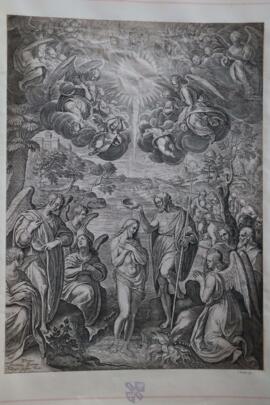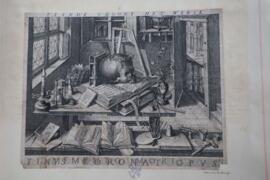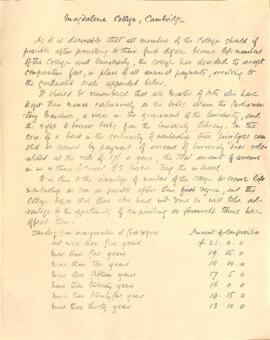No. 37
Obituaries
Rev. James Slade Maughan
Albert Ernest Bellars
Images
College Plate - The Cockerell Cups
Reports by the following Clubs and Societies
The Classical Society
The Scientific Society
Music and Dramatic Club
Boat Club
Cricket
Lawn Tennis
No. 38
Obituaries
Right reverend Dr Nevill
Reverend Charles John Meade
Reverend the Hon. Leonard Francis Tyrwhitt
William Francis Edolph Andrewes Uthwatt
Articles
The College Plate IV
Images
The College Plate - The Pepys Cup
Reports by the following Clubs and Societies
The Classical Society
The Scientific Society
Music and Dramatic Club
Rugby
Football
Hockey
Boat Club
Athletic Sports
Golf Club
No. 41
Obituaries
Irwin Edward Bainbridge Cox
Walter Adolph McCreevy
George Frederick Allcard
Rev. William Prest Pardoe Matthews
Augustus Woolbridge Godby
Articles
The portrait of Henry Howard, 4th Duke of Norfolk [MCWA/A/77] by A.C. Benson
Images
Black & white photo of the portrait of Henry Howard
Reports by the following Clubs and Societies
Boat Club
Rugby
Football
Golfing Society
Hockey
Athletics
Classical Society
Scientific Society
Musical Club
Magdalene Boys' Club
No. 42
Obituaries
Basil Arthur Forbes Davis [he and M.B.K. Raja, an Indian student at St Catharine's College, were both killed in a motor cycle collision]
Colonel Charles Edward Beck
John Tayleur
Scott Barchard Wilson
W.R. Wilkinson
Articles
A Fighting Parson [about Hammond Robertson who came to Magdalene as an undergraduate in 1775 - 'a grim, masterful and combative man'] by A.C. Benson
Images
Drawing of an undergraduate in evening dress and academic gown reading 'The Granta'
Reports from the following Clubs and Societies
The Musical Club
The Scientific Society
Debating Society
Boat Club
Rugby
Football
Hockey
Athletics
Magdalene College Boys' Club
No. 45
Obituaries
John Arthur Watson-Taylor
Charles Burdett Ogden
Frederic Stewart Hatham Dyer-Bennet
Rev. Spinan Fellows
Charles Ebenezer Treffry
Images
Illustrated poem
Reports from the following clubs and societies
Magdalene College Association
Magdalene College Boys' Club
Boat Club
Rugby
Football
Athletics
Golf
Hockey
Fives Club
Musical Club
Classical Society
Scientific Society
Law Society
No. 61
Obituaries
Captain Robert Thomas Oliver Sheriffe
Rev. Stanley Burford Welch
Images
The King of Games, the Game of Kings. The young Duke of York, afterwards James II, playing tennis at the Court (from a print in the Pepys Library)
Drawing - 'Flashlight glimpse of a farewell party given to Mr Richards by Senior Members of the College before his departure for China'
Reports of the following clubs and societies
Boys' Club
College Hockey Tour in France
Cricket
No. 50
Articles
The Election of Barton Wallop by O.F. Moreshead
Obituaries
Arthur Christopher Benson
Rev. Arundell Glastonbury St. John Mildmay
Gerard Cecil Noel
Sir Gilbert Augustus Clayton East
Arthur William Watson
Sir John Fox Dillon
Images
Arthur Christopher Benson
Reports by the following clubs and societies
Boat Club
Athletics
Rugby
Football
Hockey
Audley Society - amalgamation of the old 'Classical and Historical' and 'Scientific' Societies
Law Society
Musical Club
No. 75
Obituaries
Robert Neville-Grenville
Major John Nelson Barstow
M.R. Montagu
Articles
Charles Stewart Parnell [an account as to the events leading up to him leaving Magdalene] by A.S. Ramsey
Images
A.B. Ramsay
Reports by the following clubs and societies
Amalgamation Club list of officers for 1936-37 - Boat Club, Cricket, Rugby, Football, Hockey, Athletics, Lawn Tennis, Squash Racquets, Chess
Boat Club
Rugby
Football
Cricket
Lawn Tennis
Chess
No. 53
Obituaries
Re. canon Sydney Greenwood
Prince Frederick Victor Duleep Singh
Charles Clement Tudway
Rev. William James Robert Hunton Oliver
Charles Clement Lapage
Prebendary Thomas Longley
Articles
Francis Cranmer Penrose' (admitted to the College in 1838) by A.S. Ramsey
Reports of the following clubs and societies:
Boat Club
Athletics
Rugby
Football
Hockey
Audley Society
No. 76
Obituaries
Hon. Alice Neville
Michael O'Bryen Shute Barrington
Michael Alastair Brodie
Colonel Harold William Alexander Francis Crichton-Browne
Sydney John Stephens
John Henry Stothert
Thomas Norman Kenneth Walker
Articles
William Farish, 1759-1837, by Charles Smyth
Magdalene Boys' Club by Christopher Christian
Images
Drawing of the outline of a man's head, labelled 'Amalgamation Club?'
Two photographs of Magdalene Lads' Club at camp, King's Mead, Seaford, 1937
Reports by the following clubs and societies
Amalgamation Club list of officers for 1937-38 - Boat Club, Cricket, Rugby, Football, Hockey, Athletics, Lawn Tennis, Squash Racquets, Chess
Boat Club
Cricket
Rugby
Football
Hockey
Athletics
Squash Racquets
Chess
Quarterly undergraduate bills including draper, cook, laundress, steward, chandler, barber, bedmaker, buttery, shoemaker, books, apothecary.
At the back are receipts and payments including surplice fees at All Saints for christenings, marriages, and burials, 3 August 1712 – 21 July 1713.
Quarterly bills for each undergraduate. These are arranged by admission date of student. Then all the bills accrued by the student during their time at the College are listed.
Items include cook, tailor, buttery bill, bedmaker, shoes, barber, laundress, books apothecary, joiner, glazier, and tuition.
Printed forms giving the date, name of pupil and then the amount owed under headings including: bedmaker, butler, coals, College servant, degree fees, laundress, porter, rent, steward, tutor, bookseller, cook, druggist, grocer, hatter, housekeeper, painter and glazier, tailor, upholsterer.
Printed forms giving the date, name of pupil and then the amount owed under headings including: bedmaker, butler, coals, College servant, degree fees, laundress, porter, rent, steward, tutor, bookseller, cook, druggist, grocer, hatter, housekeeper, painter and glazier, tailor, upholsterer.
Printed forms giving the date, name of pupil and then the amount owed under headings including: bedmaker, butler, coals, College servant, degree fees, laundress, porter, rent, steward, tutor, bookseller, cook, druggist, grocer, hatter, housekeeper, painter and glazier, tailor, upholsterer.
Annual accounts for receipts and payments listing all members of College in order of seniority.
Receipts are recorded under the headings Ordinary Expenses; Commons; Sermons and Exercises and Totals.
At the end of the names is a Balance from last year; Compositions (name and amount); and Payments in the Year.
Expenses are recorded at the bottom of the page as totals and include Sermons; Commons; University Dues; and the balance in the Caterer’s hands
Loose – a number of pages including:
(1) A handwritten circular about fees to be paid to become life members of the College and University – see digital image
(2) A printed circular about membership of the Senate fees, July 1918 – see digital image
(3) Several notes of names and amounts due which were then entered in the book. They are handwritten on paper with the heading ‘Long Book’.
Records quarterly totals for necessary expenses including:
(1) wine - King's birthday, All Saints, 5th November, Sacrament
(2) tablecloths
(3) cleaning the Chapel's candlesticks
(4) bills - cook, butler, candle, baker, pewterer, glazier, bricklayer, carpenter, painter, plumber, chimney sweep, mason, laundress
(5) College sizings (butter and cheese)
(6) Xmas boxes for baker, miller, chimney sweep, the smiths
(7) greens for the Chapel
(8) glasses for the Combination room
(9) letters (specifies who from)
(10) Red coat, Blue coat
(11) Coal porter
(12) Library and Combination room servants
(13) Stewards paper and pens
(14) newspaper
(15) Corporation rent
(16) booth for the clock
(17) cook and wine for Magdalene day
(18) prisoners at the town goal and in the castle
(19) poor money - widows, a decayed tradesman, a blind man, a New England man with 12 children, several persons burnt with lightening, a man with the bloody flux, shipwrecked men, two foreign princes recommended by the King, Algerine slaves
(20) subscription to the Bridge
Records the totals for necessary expenses divided into five sections:
Quarterly Expenses Michaelmas term 1821 – Easter term 1904
For bills submitted including:
Laundress
Chimney sweep
College letters and stamps
Combination room and Hall fires
Butler's bill
Lamps and candles
Cooks wages
Contribution money and Marshalls wages
School keeper
Town crier
Cook for festivals
Chapel cleaning
Library and Cloister sweeping
Stewards paper, pen and ink
Newspaper account
Paper for May examinations
Plates and dishes
Stewards Balance Sheets 1904-1928
Signed by the Auditors (Mr Elworthy) of Peters Elworthy & Moore from year 1922/23
Receipts includes:
From kitchen – wine and gas
Baths
Profits on cycle sheds
Use of telephone
Contributions towards College servants and maintenance of the establishment
Expenses include:
College sizings
Coals
Gas
Water
Licences
Butler’s disbursements
Miss Pate (typewriting)
University Press
Individual’s names [but no details as to what the payments are for]
Assistant Stewards Balance Sheets 1923-1926
Balance Sheets for the Wine and Commons Accounts 1926-1928
Stewards Audit Sheets 1907-1916
Gives Bursar’s credit and debit to the Steward
Containing annual accounts for the College.
Containing printed annual accounts for the College signed by the Auditors.
Records the money received for and money paid from the 'Fabrick Fund'.
Received - items include:
(1) land tax from the White Bull and Half Moon
(2) additional charge on Chamber rents
(3) interest and dividends
Paid out - items include:
(1) coal, poor, smith's accounts
(2) pensions to named widows
(3) donations to building new National Schools
(4) donations to building works at various churches
Contains:
(1) Building and Living Fund Accounts, 1920-1926 (a continuation from volume MCAD/3/6/4)
(2) Composition Fund Accounts, 1883-1926
Accounts for the following scholarships and benefactions:
(1) Open Scholarships
(2) Wilfred Austin Gill's Benefaction
(3) Francis Pattrick Benefaction
(4) The Revd Mynors Bright Building Fund
(5) Pepysian Benefaction
(6) The Revd Mynors Bright Benefaction
Accounts for the Groome Scholars.
Accounts for the Peckard Trust.
Accounts for the Peckard Trust.
Accounts of the Revd Samuel Lowe (Bursar) as receiver of the rents and profits of the freehold and copyhold estates of Peter Peckard.
Used in the case in Chancery between the plaintiffs William Gretton (Master), Fellows, and Revd Samuel Lowe (Bursar) and the defendants Richard Aldworth Griffin (Lord Braybrooke), John Robinson, John Smith, Martha Caldecot and Joseph Stephenson and wife, Richard Buck and Robert Sherard and John Ferrar.
Contains account for the following:
(1) Abatements to various tenants
(2) Rates, taxes, and insurances on College buildings
(3) Repairs and improvements on College estates and College buildings
(4) Management of Estates
(5) College servants
(6) Estates on Rack Rent
(7) The Pickerel Estate
(8) Grainthorpe
(9) Steeple Ashton
(10) Peckard Vacant Fellowship
(11) Chesterton Road Cottages
(12) Audit sheet
(13) Milner Scholars Account
(14) Pepysian Benefaction
(15) Mynors Bright Benefaction and Building Fund
(16) Building and Living Fund
(17) Composition Fund
(18) Peckard Rolling Fund Account
(19) Stewards Account


